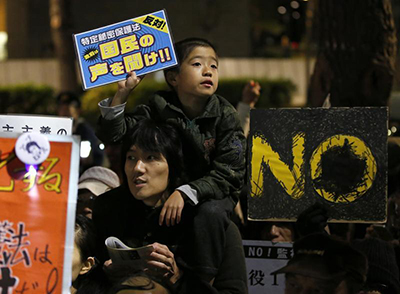On October 14, as Japan prepared to mark Newspaper Week–an event set up to promote the public right to know–Prime Minister Shinzo Abe’s cabinet publicly announced guidelines on how the country’s security law, which was passed in December 2013, is to be implemented. This date will be remembered as the point at which the public’s access to government information was decimated. Under the Protection of Specially Designated Secrets Act (SDS), whistleblowing civil servants face up to 10 years in prison and the journalists who work with them could face up to five years for leaking state secrets. The guidelines will come into force on December 10, with no opportunity before that date for the public or lawmakers to change them.
Though just guidelines, they are important because they reveal how the act will be implemented. The guidelines split state secrets into four areas: defense, foreign affairs, counterespionage, and terrorism prevention. In turn, those four areas are broken into 55 subsections. Together, they empower the heads of 19 ministries and agencies to designate which documents and subjects comprise state secrets.
With all its complexity, the law leaves many questions unanswered. The problem lies in those 55 subsections, many of which seem intentionally vague. The result is that while civil servants will be aware of a document’s classification, journalists cannot be sure just what comprises a state secret. Whistleblowing civil servants and journalists could face arrest even if they are convinced they are acting in the public’s interest. With decisions to prosecute made on a case-by-case basis, the vagueness of the guidelines could become an important tool for the government if it wanted to discourage anyone from exposing sensitive information.
After December 10 ministers will be able to extend the designated lifetime of a state secret for up to 60 years. Currently, documents classified as a state secret are protected for five years and if ministers want to extend that by more than 30 years they have to go to cabinet for approval. In some cases–and with the prime minister’s approval–under the new act ministers would be allowed to destroy documents. The precedent for this already exists.
In recent years several former executives in the Japanese foreign ministry admitted the existence of secret deals with the U.S. and, in doing so, exposed how classified documents about the deals had been destroyed. One of the most publicized cases involved a financial agreement about Okinawa being reverted to Japanese control. In another, discussions about the introduction of nuclear weapons into Japanese territory were covered up.
To head off criticism from the public, an inspector within the cabinet office will be appointed to rule on contested decisions on designating a document secret. While the inspector will be able to request that ministries reverse their decision, the power to reject requests will rest with each individual ministry. Left unexplained were questions about which body will be in charge of the decision-making process and how it will be selected. What is clear is that the inspector given this responsibility will be in the cabinet. The government insists that the inspector will be independent, a promise met with skepticism by the public and left-wing media.
When the SDS Act was under public discussion, a large number of organizations including the Japan Newspaper Publishers and Editors Association, the Japan Federation of Bar Associations, and more than 100 city and town councils, expressed objections and concerns. But political allegiances soon came into play, and the media’s unified front fell apart.
On October 15, Asahi Shimbun, one of largest dailies–and the paper for which I write–was critical of the guidelines. “The government will use the legislation to conceal inconvenient information at the expense of the people’s right to know,” the paper warned in a front-page story. And an editorial in the liberal Mainichi Shimbun argued that “the law does not value the democratic principle that national information should be open to the nation.”
But the conservative mass circulation daily Yomiuri Shimbun, whose editor-in-chief Tsuneo Watanabe is chairman of the government’s advisory council on the application of the law, praised the “multi-layered stipulations to prevent arbitrary decisions” on making the decisions on how to classify a document.
There have been plenty of editorials staking out positions, though right-wing papers seem to hold back on reporting about it and, when they do, in general they follow the lead of Abe and his cabinet. Not surprisingly, most liberal papers were in opposition, but failed to head off passage of the law or the plans for its implementation. Given the strength of the right-wing political opposition and the divisions within the media, it seems doubtful that Japan’s media will be able to fulfill its responsibilities of protecting the public’s right to government information.
